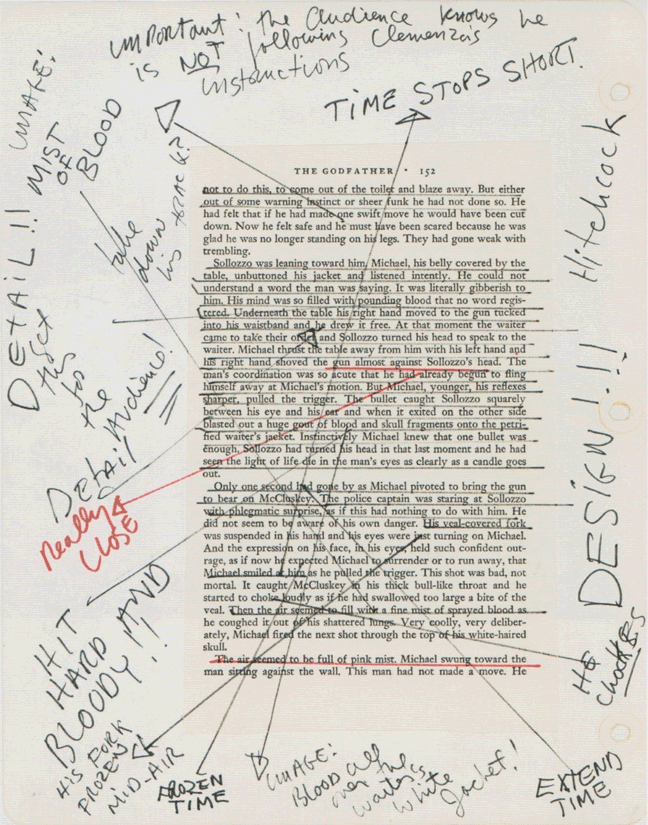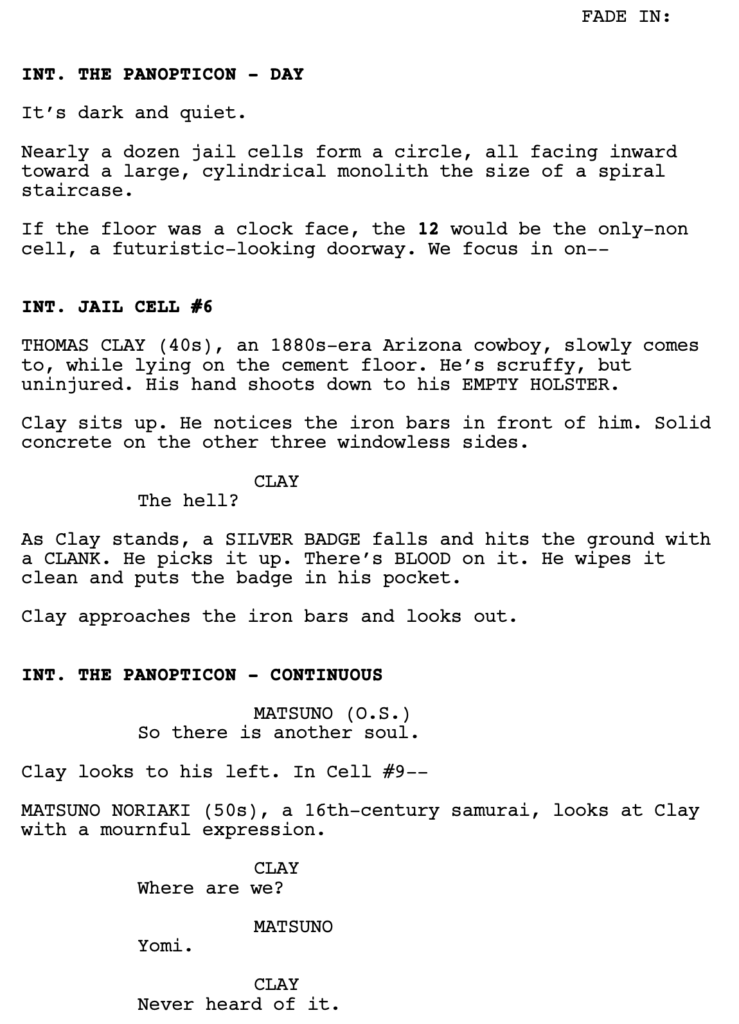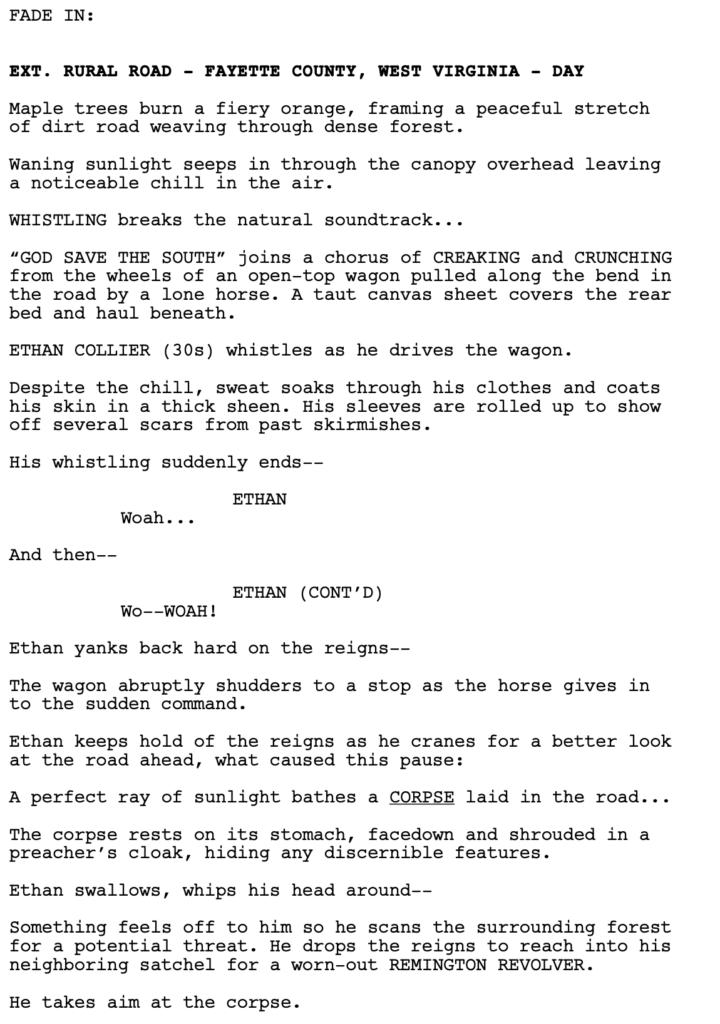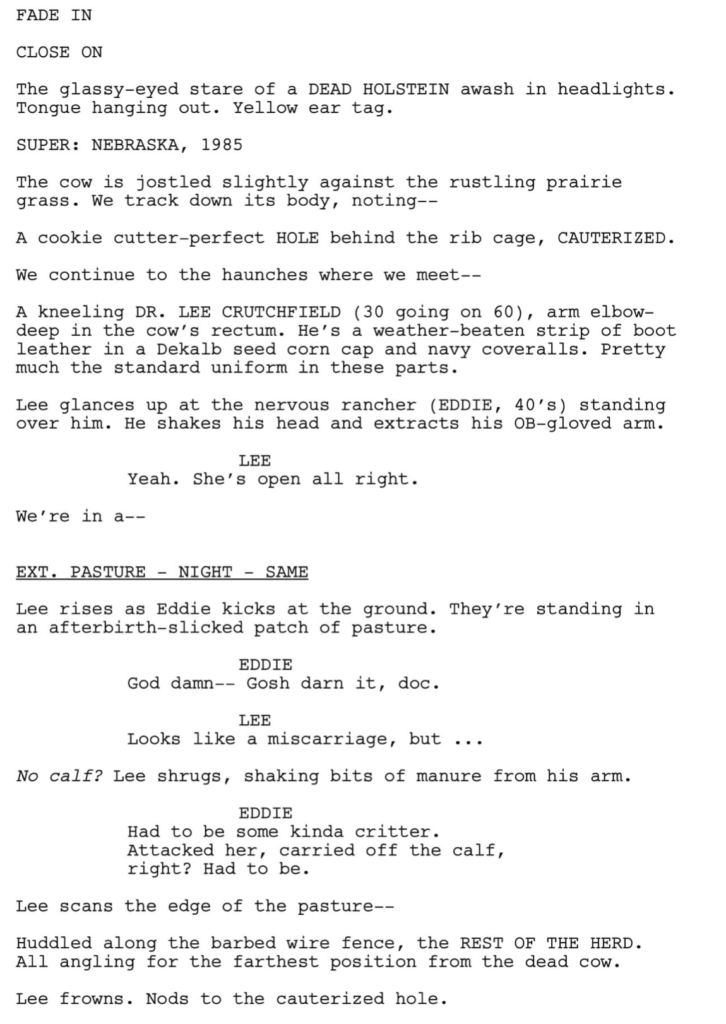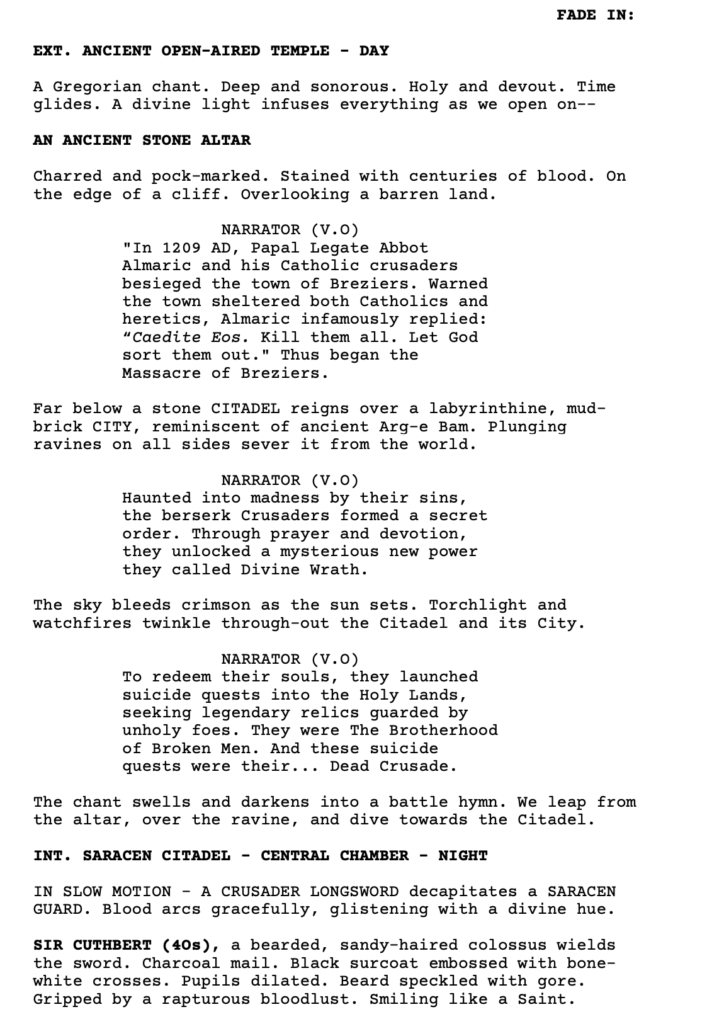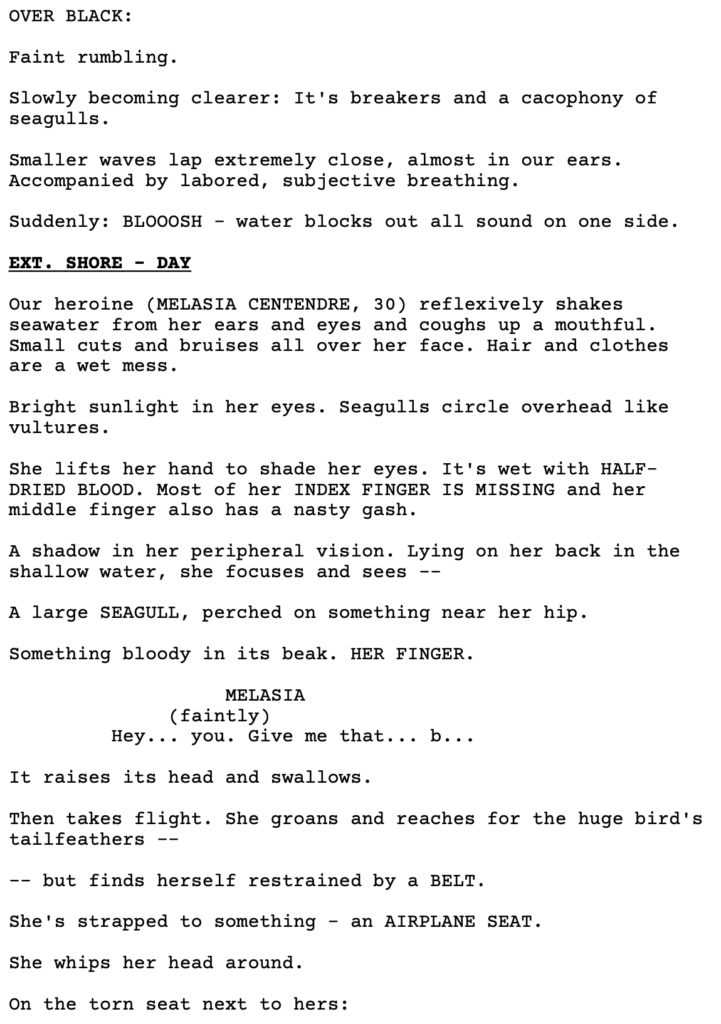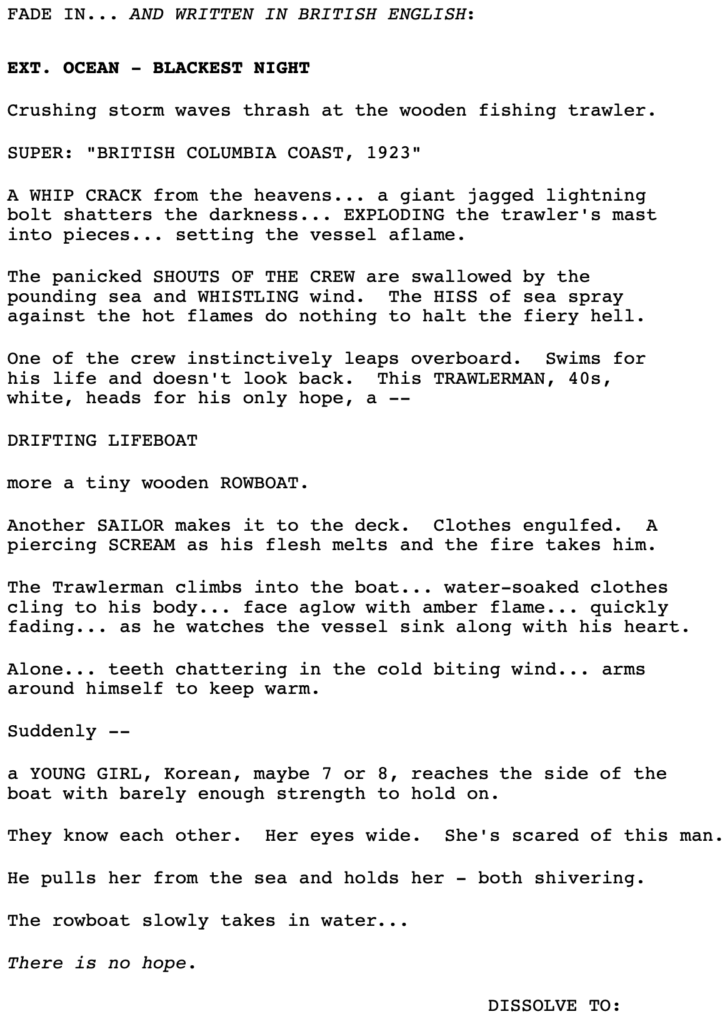One of the weirdest coolest crossovers I’ve ever read. Everything Everywhere All at Once meets Eternal Sunshine of the Spotless Mind meets When Harry Met Sally!
Genre: Rom-Com/Quirky/Sci-Fi/Drama
Premise: A relationship is put to the ultimate test when time ripples keep reinventing one of the partners, forcing the relationship to begin again… and again… and again… and again… and again…
About: I know Max Taxe has been writing since, at last, 2010, as I received a few e-mails from him back then. All that hard work is finally starting to pay dividends as he got a movie on HBO Max last year called, “Moonshot.” And now, this script is headed to Netflix via mega-production company, 21 Laps. I’m about to share some news that some of you may not like. But yes, this is yet another project that started out as a SHORT STORY. That’s how it was purchased (a pitch with a short story). Taxe then adapted it after he sold the rights into a full screenplay.
Writer: Max Taxe
Details: 98 pages
 Donald Glover for Miles?
Donald Glover for Miles?
Writers are back!
It looks like the studios and streamers finally wised up, realizing that every story AI produces reads like a fairy tale written by the Terminator. I’m not all mad at the strike though. It did give us The Golden Bachelor and 90 minute episodes of Survivor. And, of course, where we would be if Dave Filoni couldn’t write more episodes of Ahsoka? I’m not sure my Wednesdays could survive such a calamity. I need to find out what those space whales are up to!
I’ll be honest, I wonder how many professional writers wrote during the strike. Cause I know all any TV writer says is, “There’s not enough time.” So imagine if you had six months to catch up on your scriptwriting. Would Craig Maizon take that opportunity to scribble out a few Season 2 episodes of The Last of Us?
I guess we’ll never know.
But here’s something I do know. Today’s script subject matter is my kind of jam. You’ve got a little love. A little comedy. An offbeat writing voice. And then you’ve got a splash of sci-fi to disrupt it all.
Still one of my favorite scripts (that was sadly ruined by Pete Davidson, just like he ruined my chances with Emily Ratajkowski) was Meet Cute. It was similar to this premise. Girl uses a time machine to construct the perfect date. Why couldn’t the writer’s strike have disrupted that casting?
But will Ripple’s quirkiness overwhelm its charming premise? I’m going to channel my own personal 1.21 gigawatts to find out.
Miles and Sadie are two 30-somethings who have been unlucky in love. So much so that when they first meet, they openly admit that they expect their date to be a failure. But by doing so, they strip all expectations from the date, which allows them to have the best date of their lives and fall in love.
A few weeks later, some internet poster named XxNavi47xX says he’s from the future and provides winning lottery numbers to prove it. These numbers turn out to be correct and a bunch of people win money. However, this causes the first of many time ripples. Miles and Sadie’s cat, Trouble, turns into a dog. The way a ripple works is that you remember your past existence for about an hour, but that memory permanently disappears afterwards.
After this happens a few more times, Miles starts getting scared that a ripple may disappear Sadie (it already disappeared the all-girl band, Haim!). The internet connects him with a guy named Oz who has developed a system to help memories survive ripples. You write down your memories and a server bounces them back and forth a million times a second continuously so that they can migrate from one ripple to the next.
This way, when Sadie does, of course, disappear, Miles remembers her and goes after her. But, unfortunately for our lovebirds, the craziness is just getting started. It’s followed a month later by another one. And then a few weeks later by another one. In one reality, she’s the lawyer she was originally going to be before her lawyer father committed suicide. In another, she’s a hairdresser. In yet another, she’s a movie star.
Miles is able to keep finding her and get back together with her but then Navi is forced to go on the run which really starts affecting the timeline. Miles is forced to through thousands of ripple variations to find Sadie again. We can see the toll it’s taking on him and realize it’s not sustainable. At a certain point, Miles is going to have to decide whether his love for Sadie is strong enough to live this hell of an existence.
You know, I always say, if a script takes more than two genres to label, that means you’ve got a script that doesn’t work. Well, this might be the first exception. It really is a myriad of different genres and yet, somehow, it works.
I’m surprised they bought this concept as a short story pitch. Because with a script like this, it’s all about the execution. And the execution for something that exists in the murky world of time travel can go bad quickly. It’s a testament to the power of short stories in this new ultra-attention-deficit-disorder industry. I don’t think this sells if it’s only a pitch. The short story was enough of a bridge to allow 21 Laps to see where the script might go.
And it goes to some interesting places.
It starts off as this straight up rom-com, almost to the point of being cloying. The “meet cute” at The Apple Pan restaurant is too cutesy-pootsy for its own good, even as it attempts to subvert expectations.
I wouldn’t even say the script was saved by its first ripple. Because when that first ripple happens, we don’t know how deep into the concept the writer is going to go yet. It turns out, very deep.
Once we’re in the throes of over a hundred ripples, we start to feel the desperation of Miles, as well as the realization that he may have to come to terms with letting Sadie go. Cause the ripples just keep happening and his entire existence is dedicated to re-finding Sadie and starting their love story over again.
But just imagine how taxing it must be to do that hundreds of times over, with a new person that has a completely different past, only to lose them again a week later. It’s pure misery. And one of the most powerful moments in the script is when the 700th version of Sadie says to him, I’m not the person you met. I’m a copy of a fragment of a reincarnation of that person. You just need to move on.
It was heartbreaking.
But I think where Taxe really earns his writer’s stripes is in how he controls the technical side of the story. He uses this time traveler guy – Navi – as a way to influence the frequency and severity of the ripples. At first, when he’s in hiding, just posting anonymous internet comments, the ripples are soft and spaced out. But when he goes on the run, the ripples start getting more intense. Then, as the government closes in on him, they grow more intense still.
This ensures that the script is constantly changing. I always complain about how screenplays get predictable, both with what happens and how the story is paced. The way Taxe treats Navi guarantees a lot of variety in both these departments.
And I loved how, when the government finally caught him, it meant that whatever timeline we were in was the final one. No more Ripples. And in this timeline, Miles and Sadie had decided never to be together. So we’re really sad that their love story is over.
I will say this as a sci-fi geek (spoiler adjacent). There was a part of me that REALLY WANTED Sadie to be Navi. And we find out that the reason she’s been resetting her timelines was to get to a timeline where her dad was still alive. But, of course, that would’ve created some other plot messiness that might not have been able to be explained. So I’m okay with Navi being random.
I went back and forth on whether this was a double worth the read or an impressive. Cause the first half is above average. It’s enough to keep you turning the pages. But it wasn’t until I got to the last 40 pages that I truly got pulled into the story. You know what, though? It got me at the end. That final ending beat was perfect. And when a script leaves me on that high of a note, I gotta give it an impressive, man!
[ ] What the hell did I just read?
[ ] wasn’t for me
[ ] worth the read
[x] impressive
[ ] genius
What I learned: One of the best ways to get noticed is to deconstruct a genre. Take a well-known genre in a direction we don’t expect. This script takes romantic comedy to the last place I expected it to go. If you want to learn how to deconstruct a genre, read “Ripple.”
”The Continental” draws heavy inspiration from The Godfather. Does it work?

You gotta give it to the John Wick people.
They optimistically charged into a seemingly impossible task.
They took a franchise built on top of thin characterization, thinner mythology, and overly-impressive production value and migrated it to a medium that’s all about characterization, needs mythology to thrive, and doesn’t have the money to pull off great production value.
But this is what Hollywood does. It expands. And it often expands without thinking. David Goyer was just talking about this on the Happy Sad Confused podcast last week. He was writing the DC movies when Marvel blew up and he was getting non-stop notes from the studio that they had to accelerate their plans to expand their universe, leap-frogging over a second Superman film to do Batman vs. Superman instead.
That decision was widely criticized for breaking the DCEU, as it attempted to expand a universe that hadn’t yet set its foundation.
Building a show around the famous hotel in John Wick (The Continental) sounds good in practice. It’s a hotel that houses assassins. I mean, how cool is that? But this is what’s tricky about screenwriting. “General coolness” isn’t the best starting point for a movie or a show. You need a more focused idea, even for television. The more specific you can get, the better.
Gray’s Anatomy, one of the longest running shows on television, wasn’t about “a hospital in Seattle.” It was about a group of first year doctors thrown into the fire in a hospital in Seattle. And if you want to get more specific, it was about a young woman whose mother, one of the most successful doctors in the nation, had recently been diagnosed with early-onset dementia, and the challenges our heroine had of trying to navigate the hospital as a first year doctor, helping her mother, as well as living up to her reputation.
In other words, you can’t just say, “The Continental, cool assassins” and you’re finished. You have to come up with an actual idea, something that can be expanded out into a compelling story.
So what did the writers come up with?
They decided to focus the story on the man who would eventually become the manager at the Continental, Winston Scott, and set the show 50 years prior, in the 70s. Young Winston is some big shot businessman who lives a straightforward life. He’s unexpectedly called into the world of the Continental after his black sheep brother, Frankie, who he hasn’t seen in ages, steals a literal mystery box from the infamous hotel.
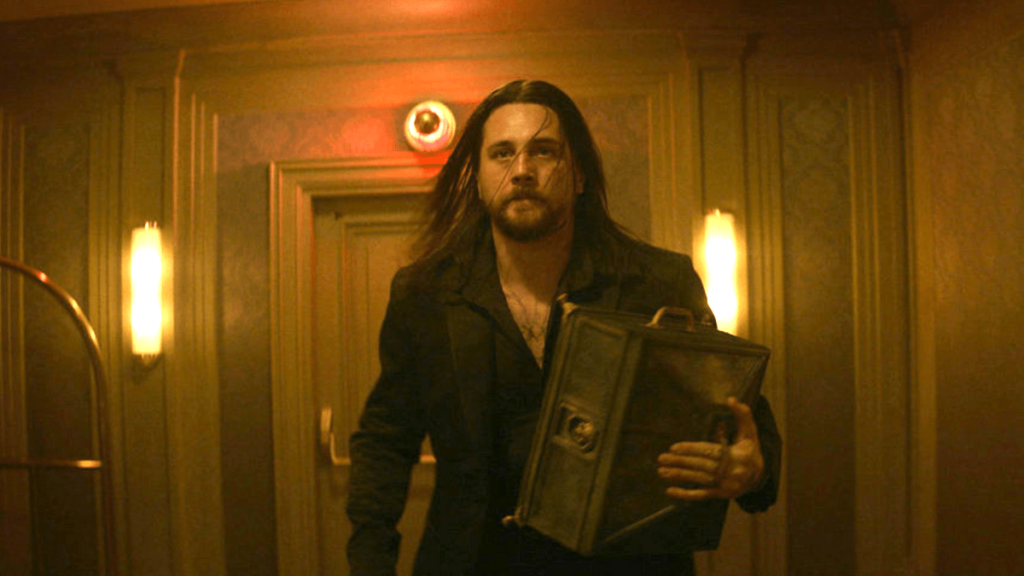
The current manager of The Continental, Cormac O’Connor (Mel Gibson), kidnaps Winston to bring him in, and demands that he find Frankie for him, so he can get his mystery box back. This sends Winston into a criminal underground which he is unfamiliar with. This storyline intersects with a couple of others, including a rookie cop, KD, who wants to know more about the mysterious Continental hotel, and a team of funky criminals who use a karate dojo as cover for their small-time criminal operation.
The Continental starts out strong. My favorite moment is when Frankie uses the cover of a big party in the Continental to break into the hotel from the subway, going up through several floors to where a giant safe is. Then he hooks onto the safe with a chain that goes all way down to the subway, where an anchor dangles and waits for a train to come. The train hooks onto the anchor, yanking the the safe door off and allowing Frankie to complete his heist. It’s quite clever.
This is followed by a fun stairway escape set piece where Frankie is having to take on assassins that are both below and above him. I always say, the best set piece you can write is one where the reader is convinced there’s no way out. And it truly feels like there’s no way out for Frankie. But through brute perseverance, he somehow takes everyone down and escapes.
I was in at that point, crafting my application letter to the Continental Fan Club.
Unfortunately, the rest of the show never quite lives up to that opening. It does have a clear goal – Cormac (and by proxy, Winston) needs to get that box back. And it does have some mystery. What’s in that box?? It also has a little Godfather to it in that Winston is the outsider. He doesn’t want anything to do with the criminal world. So it’s a fun idea to force him into that world. And, of course, we know he’s going to end up just like Michael Corleone. So, technically, we’re invested in that transformation.
But that’s where The Continental made its first mistake. For something like this to truly hit, Winston has to be a BONA FIDE outsider. Cause we’re going for a “fish-out-of-water” narrative here, with a non-criminal being forced to engage with the criminal world. All the fun is in the contrast. That’s where your conflict is going to come from and the conflict will breed the drama that powers your episodes.
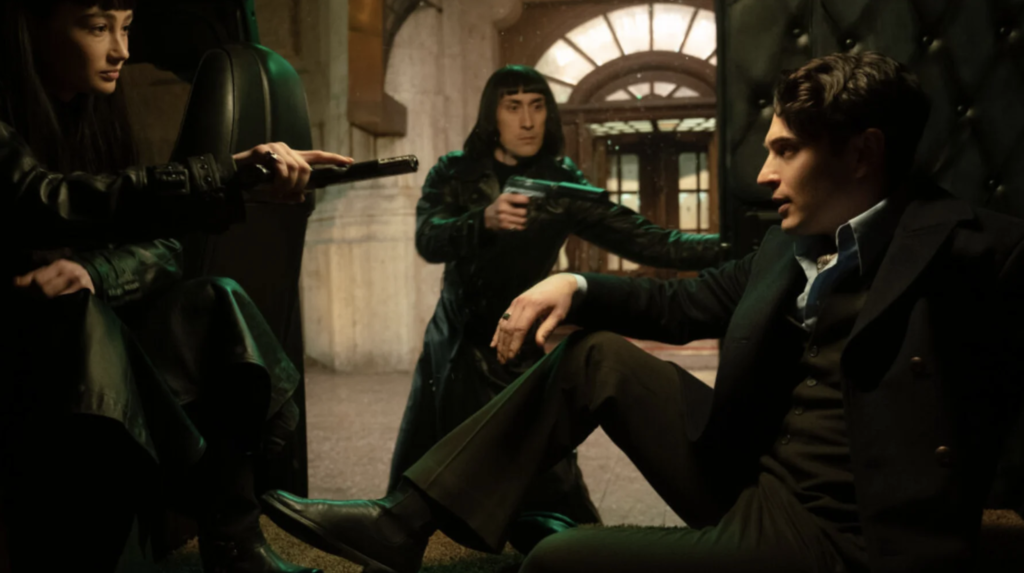
The problem was, Winston never felt that out of water. He was more like a fish being carried around in his own personal fish tank. Cause whenever he walked into a dangerous criminal situation, such as when he went looking for Frankie at the Funky Bunch Karate Dojo, his demeanor remained as calm and collected as if he’d received a preview of the John Wick movies from a time-traveling visitor, leaving him utterly assured of his survival and unfazed by any potential threats.
There’s a better creative option here. If Winston was more of a dainty nerdy financial guy who is all brains and no muscle, then we’re milking the fish-out-of-water scenario. Which is what you want! If he’s already comfortable being a bada$$, where’s the potential character growth? Cause that’s how he was in the movies.
The biggest problem with The Continental is that it doesn’t give us a character to love. We kinda like some of these characters. But we don’t love any of them. They could’ve easily fixed this by making Winston a true underdog. Place him a million miles away from the criminal world. Make him more of a nerd. The guy shouldn’t even know how to hold a gun. The more of an underdog he is, the more we would’ve loved him. I guarantee it.
In fact, I would argue that Frankie would’ve been a better Winston than Winston. Because, even though Frankie was a criminal, he was a rough-and-tumble plays-by-his-own rules criminal. He’s the opposite of the refined respectful professional criminals who work and stay at The Continental.
So at least with him, we can imagine how much he would need to go through to become Winston. A lot. Whereas the current Winston is already basically Winston from the movies.
The other big problem with this show is one that has nothing to do with the writing, and something I hate thinking about because I’m the screenwriting guy and I want to believe that any problem can be solved by the writer. But the truth is that every show you turn on for the first time is dependent on there being at least one actor who you say, “I want to know more about them.” There’s some perfect cosmic marriage between actor and character that, irrespective of the show, you just want to see more of them. The Continental does not have that.
I remember when I first saw Lost. That feeling happened almost a dozen times. Every actor who popped on screen, I said, “I want to know more about this person.” And, unfortunately, if you don’t have that, it’s almost impossible to overcome it. So, bad casting work by the show’s casting department.
I will say that they’re spending some legit dolla bills on this show. There are a lot of moments that could’ve been in John Wick movies. And setting the story in the 1970s does give the John Wick universe that slightly different feel required to separate the show from the films. And Mel Gibson as the big baddie looks to have potential.
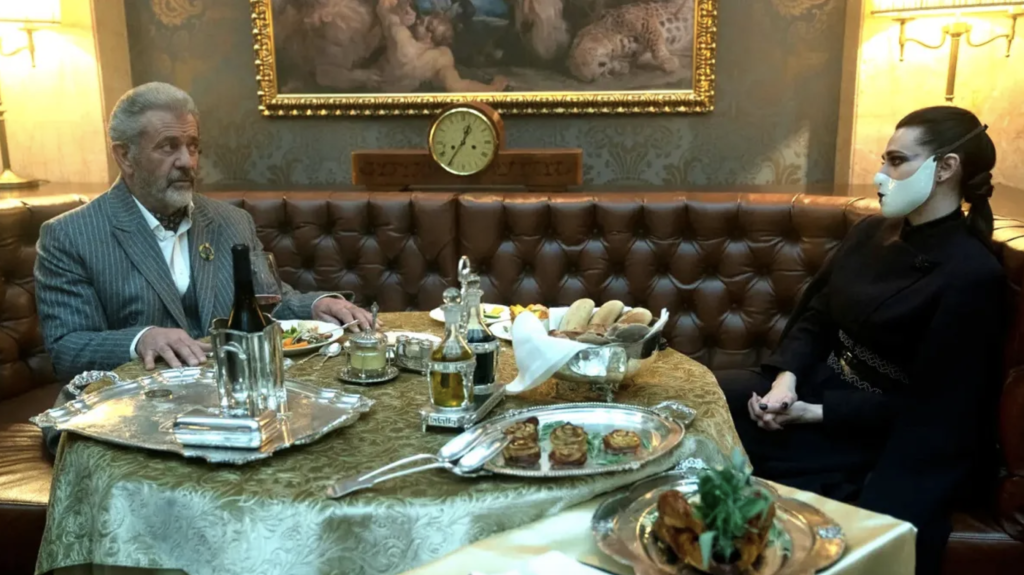
I’m just not convinced they have a real story to tell here. And that probably has to do with the fact that they’re building the show on one of the thinnest cinematic universes ever created. And I’m a John Wick fan! It’s a fun cinematic universe! But it was never a universe designed for depth.
What’d you guys think?
Come on in and vote for your favorite first page!
I’m going to be a little shameless here but I feel like I have to be. 90% of the submitted entries for First Page Showdown were uninspired. To the point where I was getting upset. I will do a First Page Consultation — 1 page of notes — for $50, for anyone who wants one. E-mail me at carsonreeves1@gmail.com.
I want to help you guys put your best foot forward. I really do. But I can’t if you’re burying your head in the sand and hoping what you’re doing is working. I know for a fact that a lot of you are good writers. But you’re not showing that in your first pages and, I promise you, producers aren’t going to read on unless you address this. I can help you come up with something a lot better.
Okay, there have been some questions this month as to why I would hold a First Page Contest. It’s kind of random, right? But here’s how I look at it. There are a lot of writers who feel like they’re getting screwed by the logline process. They believe if readers would bypass the logline and just read their scripts, they’d realize how good they were! So this showdown is for them.
It’s been educational reading all the entries. I’ll probably get into more detail on what needed improving next week. But the two biggest mistakes were choosing scenes that didn’t have enough going on to make you want to turn the page and the scenes that did have something going on were executed too predictably.
Yesterday, I pointed out a moment in one of the professional scripts where a woman pulls her hair back revealing, “scar tissue like a necklace around her neck.” That single image made me want to turn the page. I remember thinking, “What’s that about?” when reading it. I wanted to know more. Which is one way to write a compelling first page. Drop a little mystery in it. It can be that simple.
Okay, let’s get to today’s entries. For those who don’t know, Showdowns are when you, the readers, read through each submission and vote for your favorite in the comments section. Whoever gets the most votes receives a script review next week. So, make sure you read all six first-pages before voting. I was originally just going to include the pages and that’s it. But then I realized, how would you identify what you were voting for? So I’ve included the title of each as well.
Voting ends Sunday night at 11:59pm Pacific Time. Good luck!!!
First up, “Battle for the Ages.”
Second up, we have, “Haul.”
Third, we have, “The Harvester.”
Fourth up, we have, “Dead Crusade.”
Fifth, we have, “Neobiota.”
And finally, in our sixth slot is, “Wicked Grin.”
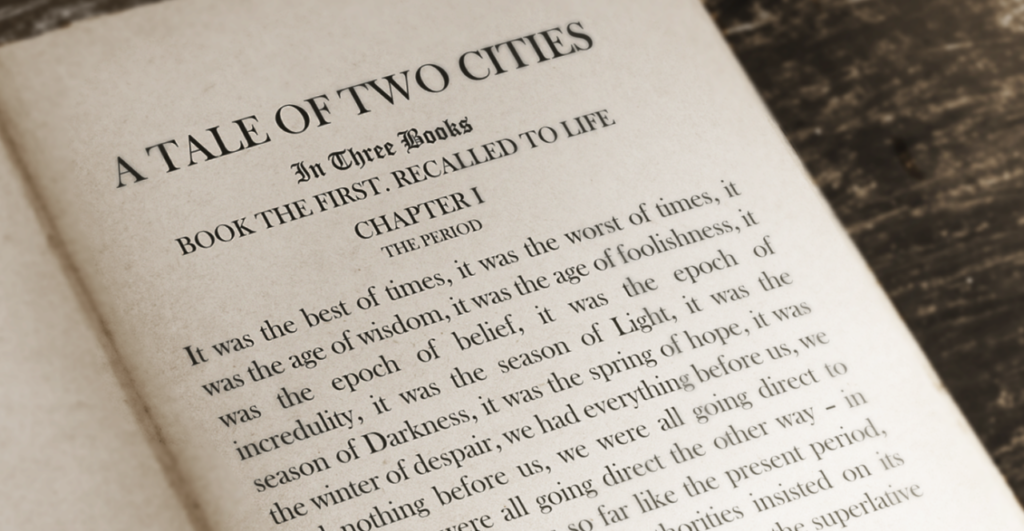
Today (Thursday) is the deadline for First Page Showdown. You submit the first page of your screenplay. I pick the five best first pages and post them tomorrow. The site votes on their favorite. Whoever wins gets a script review next Friday.
What: First Page Showdown
Send in: Title, Genre, Logline, and a PDF of the first page of your script
Deadline: Thursday, September 21st, 10:00pm Pacific Time
Where: e-mail all entries to carsonreeves3@gmail.com
Out of curiosity, I went back and looked at the opening page of the last five scripts I gave good reviews to ([xx] worth the read or higher). Here they are:
Black Kite – After a devastating wildfire wipes out a small California town, a teenage girl is missing and presumed dead. A year later, an obsessive mother and cynical arson investigator begin to suspect that she’s still alive…and in the clutches of a predator.
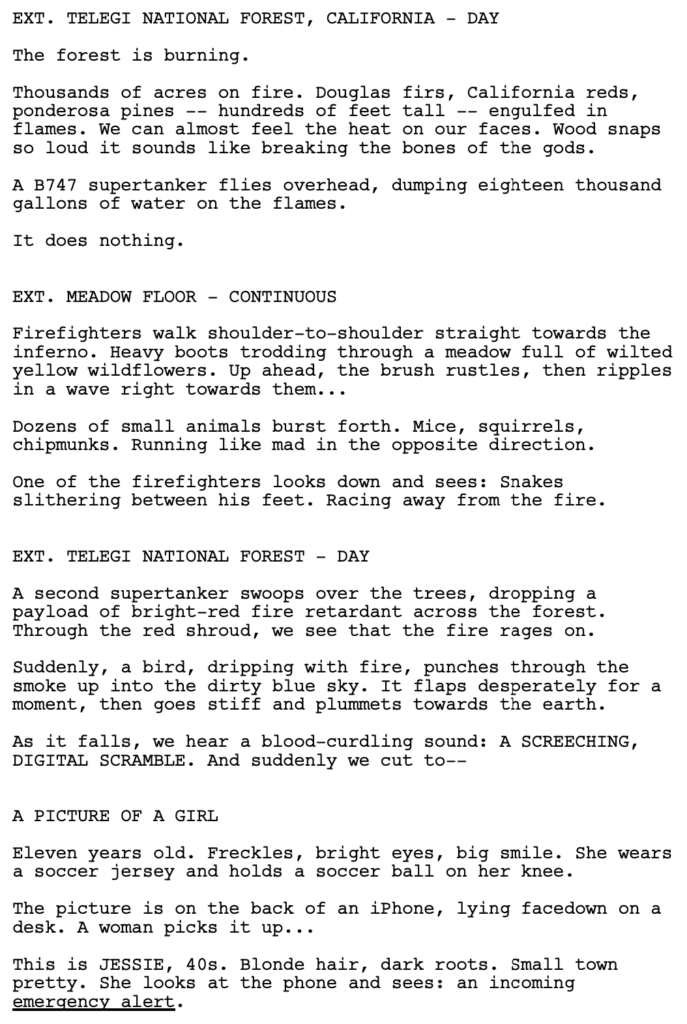
Wayward Son – When her estranged son returns and takes her grandson in the night, a veteran park ranger sets out to rescue him from the clutches of a mysterious cult deep in the Oregon woods.
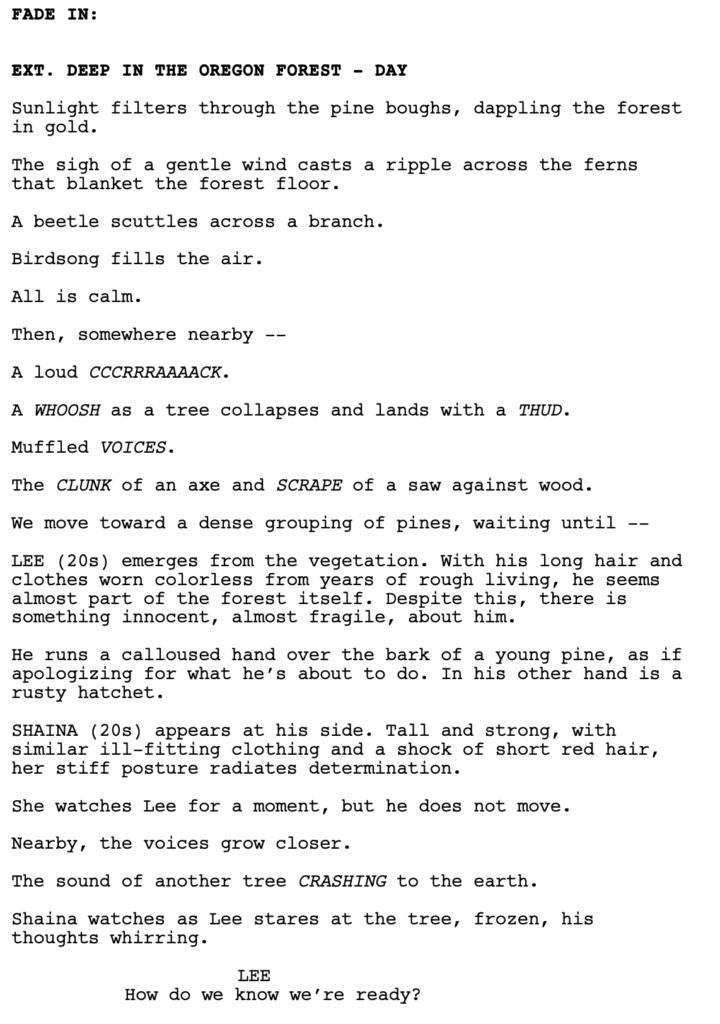
The Decameron – During the Black Plague, a group of rich Italians head off into the countryside to party out the plague in a beautiful villa.
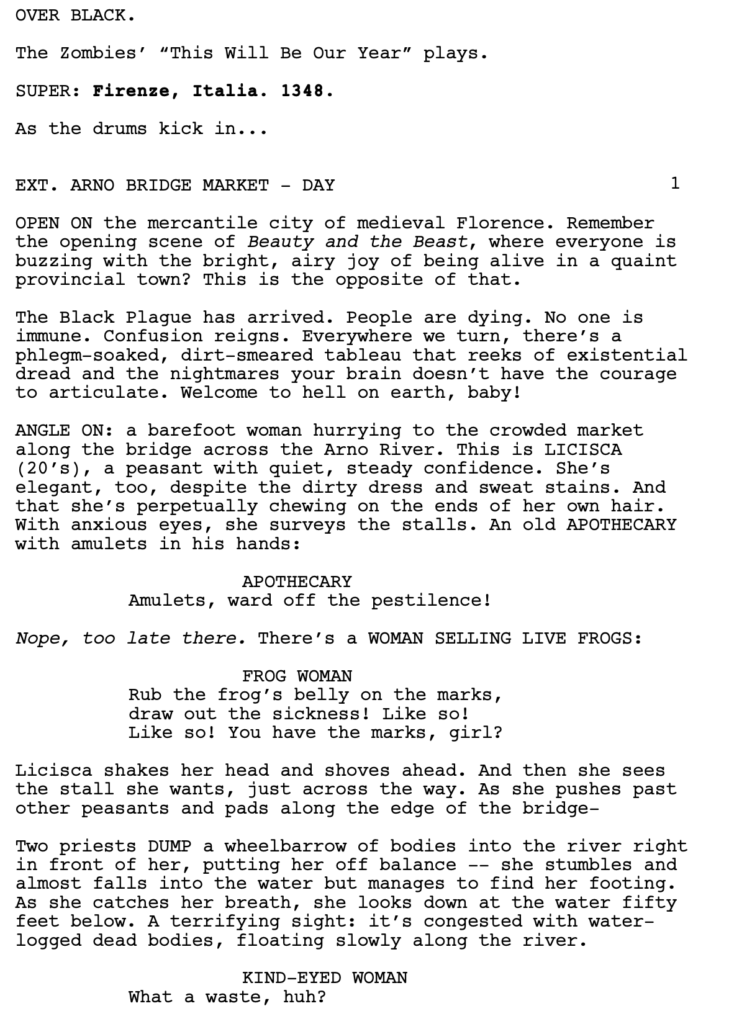
Wild – A werewolf living on a remote farm with her older sister takes in a thief on the run just 72 hours before the next full moon.
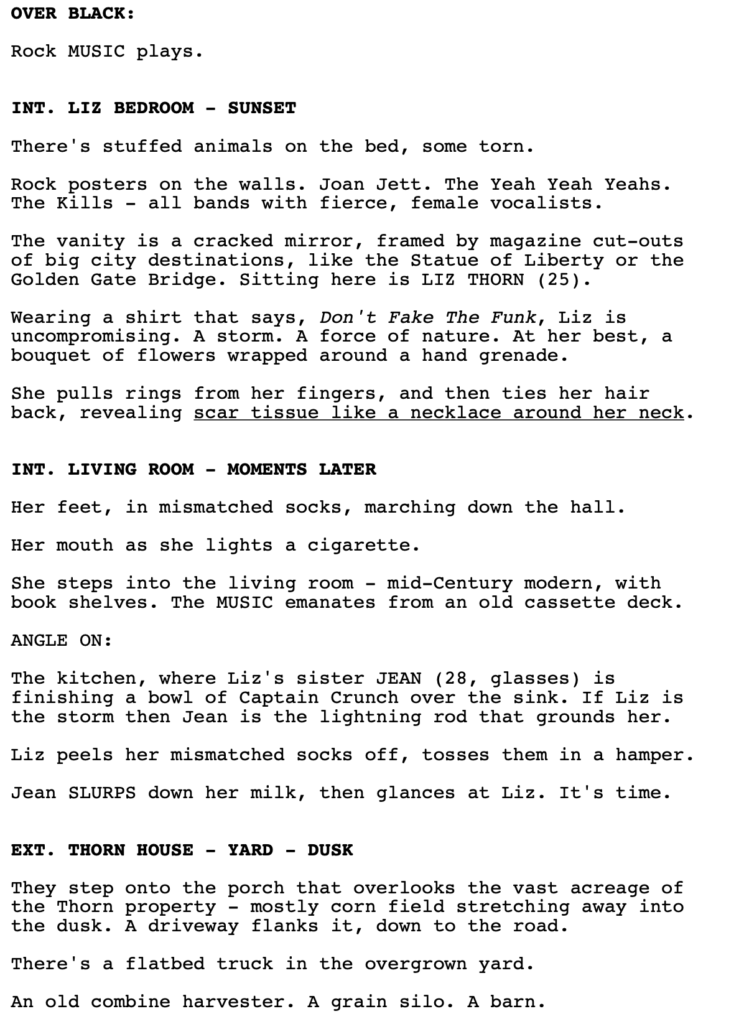
The Pack – A documentary crew in contention at the Emmys for their film about wild Alaskan wolves is hiding several big secrets about their troubled 3 month shoot.
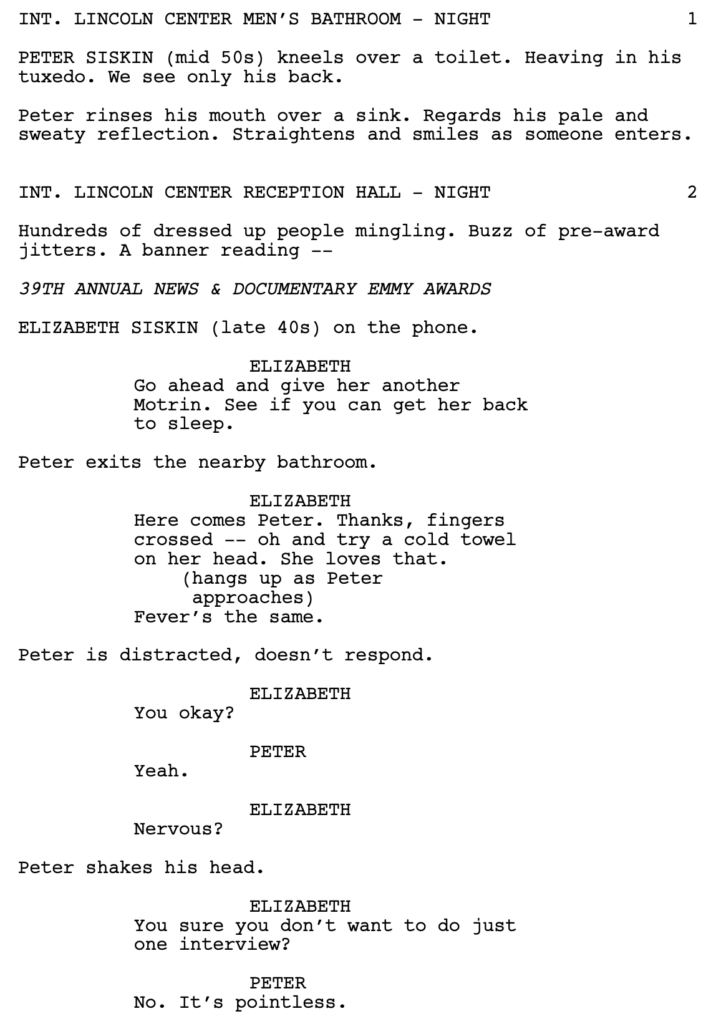
You’ll notice that not all of them start with a great first page. I’d say that both Decameron and Black Kite start strong. Wayward Son starts out all right. A little bit of mystery there. Wild throws in the “scar necklace” which makes me want to keep reading so that one was pretty good. And The Pack starts off fairly weak. This would seem to dispel the myth that a strong script is synonymous with a strong first page. Which would seem to indicate that our little showdown this month is irrelevant.
Ahhhh, but it so very much is relevant, my friends.
You see, a script read can be broken down into two categories. Those categories are, “Hafta Read” and “Give It A Shot.” “Hafta Read” is when the reader has to read the whole script whether he wants to or not. Every script I read for the site is a Hafta Read because I need to be able to discuss the story in the review!
However, nobody in the industry has a screenplay review site. For that reason, many of them read scripts from a “Give It a Shot” perspective. They’ll read the whole script if it’s good. But if something rubs them the wrong way early or they just don’t like what they’ve read, they’ll give up on it. And they’ll do it quickly.
Some of you might be confused about when this happens because, say, if a production company wants coverage on a script and gets their secretary to write that coverage then that secretary is in a “Hafta Read” scenario. There are many instances throughout the industry where someone has to read the whole script.
But a lot of scripts make it into peoples’ hands through favors. And unless the reader is close with the writer, those favors almost always exist as “Give it a Shot” reads. This just happened to me recently. I went to visit extended family and one of my family members who knew what I did had a friend who had written a screenplay and asked me if I could check it out for them.
So I did. But I did so under a “Give it a Shot” pretense. If it was good, I’d keep reading. If it wasn’t, I was out. Particularly because I had a ton of work to do at the time. It was clear to me right away that the writing wasn’t up to professional standards. So I didn’t make it past page 5. And I was being generous. I probably went 3 pages longer than I needed to.
Favors are so prevalent when it comes to reading something that most of the scenarios you’re going to be in are of the “Give it a Shot” variety. You’ll cold e-mail a manager who likes your logline and says he’ll check out your script – send it along. I guarantee you, you are not in “Hafta Read” territory with that manager. They’re giving you five pages tops.
That’s the thing with “Give it a Shot.” It means something different to every reader. For some it might mean giving the script 10 pages, others 5, and still others, 1. And the less close the reader is to the writer, the lower that number gets. If I get a script from a friend of a cousin of a friend, I have .0001 level of commitment to that person. So when I open that script, I’m ready to bail if you don’t hook me by THE FIRST PARAGRAPH.
I bring all this up to remind everyone reading this post that it’s highly likely that any industry person you can get your script to is a “Give it a Shot” situation. And because of that, writing a great first page matters. Cause the reality is that these people will be putting outsized importance on your first page and using it to determine whether they like you as a writer and if they want to keep reading.
Even if you have a few people in your rolodex who will give you “Hafta” reads, what happens if they like your script and decide to pass it up to the more important people, the ones with the power to greenlight, the ones with the money? All of a sudden you’re right back in “Give it a Shot” territory, and what are you going to do? Tell your contact to hold off while you write a new first scene? Why not write a good first page already so you can win over both of them?
Okay, Carson. But some of those scripts you gave good reviews to were able to overcome average first pages. So how did they find success? Look, there is a “luck” component to all this. Sometimes you give your script to the right person at the right time and they’re looking for something exactly like that so they’re giving your script a lot more leeway than on a normal read. And if you get somebody with power who likes your script, your script all of a sudden has buzz and becomes a “Hafta Read.”
Even if I wasn’t reviewing scripts for the site, I would still consider the top 5 Black List scripts “Hafta Reads” because they’ve been vetted and that gives me enough confidence to read through any trouble spots the scripts might have.
But most of you aren’t there yet. I wouldn’t even consider low-tier professionals in Hafta Read territory.
You know, the bar for opening pages used to be a lot lower. Even back in the 90s, when the competition was fierce, most readers just wanted to see that the first page was well-written. That the writer could construct proper sentences, the prose was easy to read, and the eyes moved down the page quickly.
But these days, with our mega-ADD addled brains, that’s no longer enough. You need to have that AND you need to have something compelling going on, something that pulls the reader in right away. It’s a lot to ask of one page but if you were hoping for a quiet relaxed career in the writing world, go be a librarian. This is professional screenwriting. It’s where the big boys play. The bar is high.
It’s going to be interesting to see what pages make the cut for tomorrow’s Showdown. Maybe I surprise myself and include a page where nothing is happening but the writing is outright stellar. I just don’t know. But I’ll tell you this. I’m excited to find out. And I’m even more excited to see how good the winning script is.
The First Page Showdown deadline is this Thursday at 10pm! Here’s how to enter!
Genre: Comedy
Premise: A 13 year-old boy blackmails his favorite pop star into being his best friend.
About: This script received 8 votes on last year’s Black List. Writer James Morosini got some nice buzz a few years back for his indie film, I Love My Dad, about a dad who catfishes his son on a dating app in the hopes of getting to know him better.
Writer: James Morosini
Details: 94 pages
 Brie Larson was already a pop star in a former life. So she should have no problem playing one.
Brie Larson was already a pop star in a former life. So she should have no problem playing one.
I know people are saying the Black List is dead.
I think one of you quoted a Hollywood agent who said, “If it’s on the Black List, I know it’s bad.”
Believe me, I’m not supporting the last four years of this list. I know the quality has gone down.
But let me ask you a question. If the Black List is irrelevant, how does Hollywood find writers anymore? There aren’t spec sales anymore. So if there are no specs and no Black List, how do writers get discovered?
There are only two avenues left. Writer-directors (direct your own scripts, bypassing the pipeline). And television writing. Get on a writing staff, make a name for yourself, then write a feature script that your agent sends out and hope someone likes it.
I’m not sure I buy the Black List is dead hype entirely. There are still ten legitimately good scripts to come out of the list a year. It just sucks that you have to wade through 70 other writtenly-challenged ones to find them.
Let’s find out if today’s script is one of the 10… or one of the 70.
Benny is a chubby 13 year old gay super-fan of Alice Foxx, who I’m guessing is inspired by Ariana Grande. That’s because Alice is a straight up b*tch. She spends the majority of her time complaining to her sister/manager, Nicole, about the mistakes that are made during her concerts (“The sync was off!”).
But Alice is not the nastiest character in the story. That title goes to Rick Ferraro, an aggressive paparazzo who feels like his early pictures of Alice made her a star and is bitter that she no longer gives him the time of day.
After her latest LA concert, Alice heads to the In and Out on Sunset (a woman after my heart) and dials up a double-double in the drive-thru. It just so happens Benny, who also needed to get his In and Out on, spots her, and chases her a few streets down where she parks on a side street to eat her In and Out in privacy (there’s nowhere around that In and Out to park but I’ll allow it).
While slinging delicious farm-fresh fried potatoes at her tonsils, the evil Rick Ferraro pops up and starts taking pictures of her. Alice tries to get away but accidentally hits him. She stops, apologizes, but he gleefully screams that he’s going to sue her. Enraged, she slams on the gas a second time, and with this one, she knocks him down hard enough to kill him! Just as this happens, Benny pulls up. Alice and Benny share a look and then Alice speeds off.
Benny reminds Alice about their mutual secret at Alice’s next fan meet-and-greet so Alice takes Benny backstage and asks him what he wants. Benny simply says, “I want to be your friend.” Alice figures she can give Benny the best day of his life then send him on his way and the problem will be solved. But after the day to end all days, Benny only wants to spend more time with Alice. In fact, he wants to spend the rest of his life with her.
Back in the 80s, Bill Murray came to Ron Howard with a project he wanted Howard to direct. Howard read the script, met with Murray, and told him he couldn’t see himself directing the project. “Why not?” Murray asked. “Well, there’s no one to root for in this story.” Howard said. This single answer enraged Murray so much that he blacklisted Ron Howard and never talked to him again.
Murray, a great performer, may not have been educated on the world of screenwriting at the time. But it’s a legitimate concern. You need the audience to root for at least one of your main characters.
You’d think we’d root for Benny here. He’s awkward. He has no friends. He’s sweet.
But Benny isn’t a real person. He’s so naive as to be oblivious to reality. He doesn’t live in a real life universe. His parents are dead and his grandma is, conveniently, asleep all the time, allowing this 13 year old kid to disappear for days at a time. His only language is weird dancing and regurgitating pop song lyrics. Benny is a caricature. He’s not a character.
That leaves us with Alice. Alice is a more complex character but she’s one of the most unlikable people ever. She’s selfish (she skips a Make-A-Wish meeting because the experience would be annoying). She doesn’t appreciate what she has. She’s always complaining. She’s annoyed by Benny and is always looking for ways to ditch him. So, of course we’re not rooting for her.
So who’s left? Nobody. And I’m sorry Bill Murray but, if there’s no one to root for, it’s hard to become engaged in a script.
But maybe they cast someone as Benny who’s so charming that we do root for him. It’s happened before. Well, even if you can get on board with Benny, this script still has major tonal issues. I talk about tone a lot on the site and I rarely go into detail about what ‘tonal issues’ means. So let’s give it a shot.
It boils down to a script that vacillates recklessly between two opposing extremes. For example, Benny is threatening to put Alice in prison for the rest of her life if she isn’t his friend. Seconds later, he’s bumbling around like a drunk weirdo doing a meme-worthy dance. I’m not convinced you can have it both ways. Is this a serious movie about a stalker or is it a straight-up comedy? The script keeps bouncing back and forth between the answer to that question.
With this type of story – and I’ve read dozens of scripts that have had this setup – they work best when the main character is competent and calculated. You need a character who we believe is able to execute a blackmailing plan in order to buy in. I suppose you could argue there’s something scarier about an idiot blackmailing you. Because they don’t use logic. But Benny is so pure that I never once believed he would give Alice up.
On top of all that, the screenplay feels rushed. The writer never commits to any details to make me believe this is a real pop star. If you’re covering a specific subject matter in your script, you have to give us AT LEAST ONE THING about that subject matter that we don’t know. In one of my favorite movies of the year, Blackberry, we get this early scene in the boardroom that goes into highly specific territory about how the Blackberry works. That helps sell us on the world, which, in turn, pulls us in.
If anything, I got the opposite impression from “Pop.” Alice sells CDs at her concert! Because we all know those Gen Z 15 and 16 year olds love CDs. It’s just as important to them as improving their laserdisc collection.
If there’s a caveat to this analysis, it would be that Morosini is a writer-director. Writer-directors are more adept at attacking potential tonal issues than when you separate the writer and director. I saw this in Birdman’s script-to-screen. I saw it in Three Billboard Outside Ebbing, Missouri’s script-to-screen. However, you got a lot of convincing you need to do to get me to believe “Pop” is in the same category as those films. Benny’s goofiness undermines everything the script is trying to do, which is pose a threat to Alice.
[ ] What the hell did I just read?
[x] wasn’t for me
[ ] worth the read
[ ] impressive
[ ] genius
What I learned: The official definition of a caricature is a distorted representation of a person in a way that exaggerates some characteristics and oversimplifies others. Which explains the character of Benny to a “T” (exaggerates: speaks mainly through his wild dances. Oversimplifies: Literally the only thing he cares about in life is being friends with a pop star). Caricatures can work with secondary characters in comedy scripts. But I’m not sure I’ve ever seen one work in the lead role.

